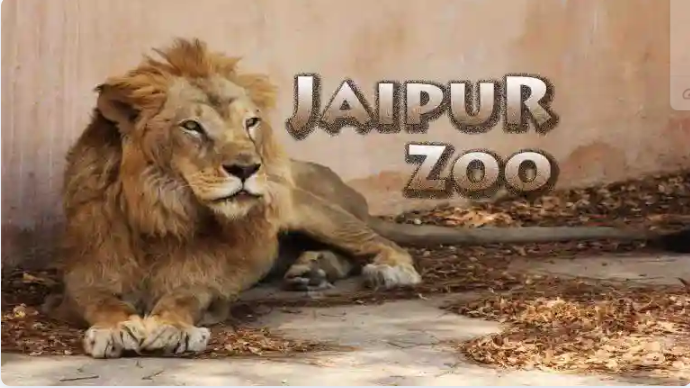In today's digital age, having a strong online presence is crucial for businesses to succeed.…

Jaipur Zoo
Exploring the Wonders of Wildlife at Jaipur Zoo: A Gateway to Biodiversity
India, a land of diverse landscapes and rich biodiversity, is home to several mesmerizing wildlife sanctuaries and zoos. One such gem nestled in the heart of the vibrant city of Jaipur is the Jaipur Zoo. This haven for nature enthusiasts and animal lovers alike offers an incredible opportunity to witness the wonders of the animal kingdom up close. In this article, we delve into the magical world of Jaipur Zoo, exploring its fascinating inhabitants and the conservation efforts that make it a crucial hub for wildlife education and awareness.
A Glimpse into Jaipur Zoo’s History
Established in 1877, Jaipur Zoo, also known as the Zoological Garden, holds the distinction of being one of the oldest zoos in India. Spanning over 33 acres, this zoological park is not only a recreational spot but also a hub of education and conservation activities. Over the years, it has played a significant role in preserving endangered species and raising awareness about wildlife conservation.
Biodiversity Marvels at Jaipur Zoo
Jaipur Zoo boasts a diverse array of wildlife, including rare and exotic species. Visitors can witness majestic big cats like lions and tigers, playful primates such as chimpanzees and orangutans, and graceful avian species in the bird aviary. The zoo is also home to various reptiles, amphibians, and colorful fish, showcasing the rich aquatic life of the region. Each enclosure is meticulously designed to mimic the natural habitat of the animals, ensuring their physical and mental well-being.
Conservation Initiatives and Education
Apart from being a popular tourist destination, Jaipur Zoo actively engages in conservation initiatives. The zoo participates in breeding programs for endangered species, aiming to reintroduce them into their natural habitats and prevent their extinction. Moreover, the zoo conducts educational programs and workshops for schools and colleges, raising awareness about wildlife conservation, biodiversity, and the importance of preserving natural ecosystems.
Visitor Experience and Recreational Activities
Jaipur Zoo offers a holistic experience to its visitors. Apart from admiring the splendid animals, visitors can enjoy various recreational activities within the zoo premises. Children can delight in the joyous rides and play areas, making their visit both educational and entertaining. Additionally, the zoo hosts events and exhibitions related to wildlife, providing visitors with an opportunity to interact with experts and learn more about the animal kingdom.
Challenges and Future Prospects
While Jaipur Zoo has made remarkable strides in wildlife conservation and education, it faces challenges such as habitat loss, climate change, and poaching, which threaten the very existence of several species. To address these challenges, the zoo collaborates with governmental and non-governmental organizations, working tirelessly to protect endangered species and their habitats.
Animal Rehabilitation and Rescue: Jaipur Zoo plays a vital role in rescuing and rehabilitating injured or abandoned animals. The zoo’s dedicated team of veterinarians and caretakers work tirelessly to nurse these animals back to health, ensuring they can eventually return to their natural habitats. This compassionate approach highlights the zoo’s commitment to animal welfare and conservation.
Breeding Programs and Endangered Species: Jaipur Zoo actively participates in breeding programs for endangered species, contributing significantly to the preservation of rare animals. Through controlled breeding and meticulous care, the zoo has successfully bred several endangered species, boosting their populations and preventing their extinction. This effort is essential in maintaining genetic diversity within these species.
Research and Conservation Studies: Researchers and conservationists at Jaipur Zoo conduct studies on animal behavior, health, and ecology. These studies not only contribute to the scientific community’s understanding of wildlife but also aid in devising effective conservation strategies. By staying abreast of the latest research, the zoo can implement informed decisions in their conservation efforts.
Community Engagement and Eco-Tourism
Jaipur Zoo actively engages with local communities, promoting eco-tourism and creating awareness about the importance of wildlife conservation. The zoo organizes eco-tours, nature walks, and interactive sessions, encouraging the public, especially students, to appreciate and respect nature. These initiatives foster a sense of responsibility towards the environment and wildlife among the local populace.
Preservation of Indigenous Flora: The zoo not only shelters animals but also preserves indigenous flora within its premises. This botanical diversity is essential for creating a natural environment for the animals and contributes to the conservation of local plant species. Visitors can explore these green spaces, learning about the significance of preserving native plants for both animals and the ecosystem.
Awards and Recognition: Jaipur Zoo has received accolades and awards for its outstanding contributions to wildlife conservation and education. Recognitions from national and international conservation organizations highlight the zoo’s dedication to the cause. Such recognition not only validates their efforts but also inspires other institutions and individuals to actively participate in wildlife conservation endeavors.
Sustainable Practices and Environmental Conservation
The zoo promotes sustainable practices such as waste recycling, energy conservation, and water management. These eco-friendly initiatives minimize the zoo’s environmental footprint, setting an example for visitors and neighboring communities. By adopting sustainable practices, Jaipur Zoo showcases the importance of responsible environmental stewardship.
Conclusion: Jaipur Zoo, with its multifaceted approach encompassing conservation, education, research, and community engagement, stands as a beacon of hope in the realm of wildlife preservation. As visitors wander through its lush pathways, they not only witness the beauty of nature but also become part of a larger movement dedicated to protecting our planet’s most precious inhabitants. In a world where the future of countless species hangs in the balance, Jaipur Zoo serves as a reminder that every effort, no matter how small, contributes significantly to the grand tapestry of biodiversity conservation.
Animal Rehabilitation and Rescue: Jaipur Zoo plays a vital role in rescuing and rehabilitating injured or abandoned animals. The zoo’s dedicated team of veterinarians and caretakers work tirelessly to nurse these animals back to health, ensuring they can eventually return to their natural habitats. This compassionate approach highlights the zoo’s commitment to animal welfare and conservation.
Breeding Programs and Endangered Species
Jaipur Zoo actively participates in breeding programs for endangered species, contributing significantly to the preservation of rare animals. Through controlled breeding and meticulous care, the zoo has successfully bred several endangered species, boosting their populations and preventing their extinction. This effort is essential in maintaining genetic diversity within these species.
Research and Conservation Studies: Researchers and conservationists at Jaipur Zoo conduct studies on animal behavior, health, and ecology. These studies not only contribute to the scientific community’s understanding of wildlife but also aid in devising effective conservation strategies. By staying abreast of the latest research, the zoo can implement informed decisions in their conservation efforts.
Community Engagement and Eco-Tourism: Jaipur Zoo actively engages with local communities, promoting eco-tourism and creating awareness about the importance of wildlife conservation. The zoo organizes eco-tours, nature walks, and interactive sessions, encouraging the public, especially students, to appreciate and respect nature. These initiatives foster a sense of responsibility towards the environment and wildlife among the local populace.
Preservation of Indigenous Flora
The zoo not only shelters animals but also preserves indigenous flora within its premises. This botanical diversity is essential for creating a natural environment for the animals and contributes to the conservation of local plant species. Visitors can explore these green spaces, learning about the significance of preserving native plants for both animals and the ecosystem.
Awards and Recognition: Jaipur Zoo has received accolades and awards for its outstanding contributions to wildlife conservation and education. Recognitions from national and international conservation organizations highlight the zoo’s dedication to the cause. Such recognition not only validates their efforts but also inspires other institutions and individuals to actively participate in wildlife conservation endeavors.
Sustainable Practices and Environmental Conservation: The zoo promotes sustainable practices such as waste recycling, energy conservation, and water management. These eco-friendly initiatives minimize the zoo’s environmental footprint, setting an example for visitors and neighboring communities. By adopting sustainable practices, Jaipur Zoo showcases the importance of responsible environmental stewardship.
Jaipur Zoo, with its multifaceted approach encompassing conservation, education, research, and community engagement, stands as a beacon of hope in the realm of wildlife preservation. As visitors wander through its lush pathways, they not only witness the beauty of nature but also become part of a larger movement dedicated to protecting our planet’s most precious inhabitants. In a world where the future of countless species hangs in the balance, Jaipur Zoo serves as a reminder that every effort, no matter how small, contributes significantly to the grand tapestry of biodiversity conservation.
Wildlife Rehabilitation Center
Jaipur Zoo serves as a wildlife rehabilitation center, providing a safe haven for animals that have been confiscated from illegal trade or rescued from captivity. These animals often face physical and psychological challenges due to their past experiences, and the zoo’s dedicated staff works tirelessly to rehabilitate them, allowing them to live out their lives in a secure and nurturing environment.
Veterinary Care and Health Monitoring: The zoo’s veterinary hospital is equipped with state-of-the-art facilities, ensuring the health and well-being of all its inhabitants. Regular health check-ups, dietary assessments, and specialized medical care are provided to every animal. The meticulous health monitoring system helps in early detection of diseases, enabling prompt intervention and ensuring the animals lead healthy lives.
International Collaborations and Exchange Programs: Jaipur Zoo collaborates with international conservation organizations and other zoos worldwide. Through these collaborations, the zoo participates in exchange programs where animals are transferred between institutions for breeding purposes. These exchanges enhance genetic diversity and contribute significantly to the global conservation efforts of endangered species.
Public Awareness Campaigns
Recognizing the power of public awareness, Jaipur Zoo conducts extensive campaigns both within and outside its premises. These campaigns focus on pressing issues such as wildlife trafficking, habitat destruction, and climate change. By educating the public, the zoo aims to inspire behavioral change, encouraging people to make eco-friendly choices and actively participate in conservation initiatives.
Seed Bank and Plant Conservation: In addition to animal conservation, Jaipur Zoo operates a seed bank and engages in plant conservation efforts. The zoo collects and preserves seeds of endangered plant species, ensuring their genetic diversity is conserved for future reforestation projects. This initiative supports the overall ecosystem by maintaining the natural habitat essential for the animals residing within the zoo.
Disaster Preparedness and Emergency Response: The zoo has comprehensive disaster preparedness and emergency response plans in place to safeguard both the animals and visitors during natural disasters or unforeseen events. Regular drills are conducted to train staff for evacuations and to handle various emergency situations, ensuring the safety and well-being of everyone present within the zoo premises.
Continuous Expansion and Enclosure Enrichment
Jaipur Zoo constantly works on expanding and enhancing its enclosures, striving to create environments that closely resemble the animals’ natural habitats. Enrichment activities, such as puzzles, toys, and interaction with caretakers, are regularly introduced to keep the animals mentally stimulated and physically active, ensuring their overall welfare.
Partnerships with Indigenous Communities: The zoo collaborates with indigenous communities residing near wildlife habitats. By involving these communities in conservation initiatives, providing education, and supporting sustainable livelihoods, Jaipur Zoo fosters a sense of shared responsibility. These partnerships help in reducing human-wildlife conflicts and contribute to the conservation of natural ecosystems.
Jaipur Zoo’s multifaceted approach encompassing conservation, education, research, and community engagement demonstrates its unwavering commitment to the preservation of wildlife and natural habitats. Through innovative initiatives and a dedicated team, the zoo continues to inspire generations, fostering a deep love and respect for the incredible biodiversity our planet is blessed with.
Conclusion
Jaipur Zoo stands as a testament to India’s commitment to preserving its rich biodiversity. By providing a haven for endangered species, conducting educational programs, and promoting awareness, the zoo not only entertains but also enlightens its visitors. As we step into this incredible sanctuary, we embark on a journey of discovery, gaining a deeper understanding of the delicate balance of nature and our responsibility to protect it. Jaipur Zoo, with its vibrant tapestry of wildlife, remains a beacon of hope, reminding us of the importance of coexisting harmoniously with the magnificent creatures that share our planet.




This Post Has 0 Comments